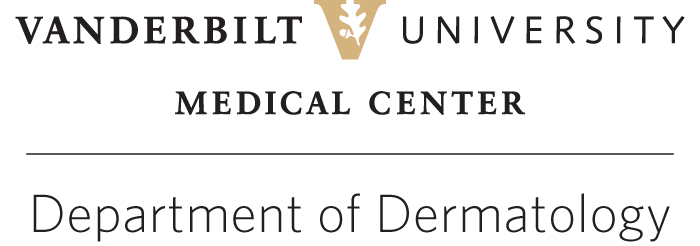Residency Clinical Education
Return to the Residency Home Page
Foundations of Determatology Education
Dermatology is a complex field that crosses multiple fields of medicine. To create a cohesive program that provides an optimal learning environment, the department has defined the following separate areas of dermatology education as the foundation of the residency program.
Outpatient Medical Dermatology
In attending clinics, residents rotate one-on-one during their first, second and third years through a variety of general dermatology and subspecialty clinics. Subspecialty clinics include the cutaneous T-cell lymphoma clinic, pigmented lesion/melanoma clinic, and rheumatology/dermatology clinic.
Many of the general dermatology clinics have complex patients throughout the schedule, and residents will become expertly trained in the evaluation and treatment of hair disorders, neutrophilic disorders, nail disorders, rheumatologic disorders with cutaneous manifestations, pigmentation disorders, vulvar disease, autoimmune blistering disorders, hidradenitis suppurativa, and cutaneous reactions to cancer therapies.
Our residents also rotate through clinic at Nashville General Hospital, our local county hospital that services a patient population that is primarily underinsured or uninsured. Schedules rotate with each block, exposing residents to all faculty members.
Outpatient Pediatric Dermatology
Residents rotate through pediatric dermatology clinics during the first and third years with Dr. Michael Smith. Dr. Lorin Bibb is joining faculty as our second board-certified pediatric dermatologist in Fall 2024. Residents learn how to evaluate and treat pediatric dermatologic diseases in patients ages 0 to18. There are also opportunities to rotate through pediatric rheumatology clinics, and to participate in the multi-disciplinary vascular malformation clinic.
Dermatologic Surgery/Procedural Dermatology
During the second and third years, residents learn how to manage the treatment of benign and malignant cutaneous lesions. During each of these years, two of the five-week blocks are dedicated to surgical training, including hands-on experience with Mohs micrographic surgery and excisional surgery techniques.
The Department of Dermatology at VUMC has three Mohs surgeons, and the Mohs surgical suite is contiguous with the outpatient clinic space. Residents during their first and second years also receive direct surgical training including excision of benign and malignant lesions under the guidance of both the Procedural Dermatology Fellow and third-year residents at the Nashville VA Medical Center.
Cosmetic Dermatology
During the second and third years, residents gain exposure to cosmetic therapies and laser surgery in the procedural suite at the VUMC outpatient clinical site. Vanderbilt Dermatology has a fractionated and fully ablative CO2, pulse-dye, alexandrite, and Nd:Yag laser. Treatment of pigmented lesions, vascular lesions, ablative resurfacing, scar revision, tattoo removal, and laser hair removal are all included in the cosmetic training curriculum. Beyond lasers, residents receive instruction in toxin and filler injections during evening hands-on cosmetic sessions.
Inpatient Adult and Pediatric Dermatology
Residents start call during the second half of the first year, then complete two inpatient dermatology consult blocks during the second year. The consult service sees patients at both Vanderbilt University Hospital and Monroe Carell Jr. Children’s Hospital at Vanderbilt. Consult time is “protected” with no other clinical responsibilities other than weekly continuity clinic.
The consult service is run by Dr. Anna Dewan, who is fellowship trained in Complex Medical Dermatology. Outpatient follow-up for patients is then completed by the residents in continuity clinic and at Nashville General Hospital, allowing for longitudinal learning experiences.
Dermatopathology
The dermatopathology training at VUMC is unique and renowned. Glass slide reviews (one day of textbook review, and one day of unknowns) are held twice weekly by our three dermatopathologists, Drs. Alan Boyd, Jeff Zwerner, and Eman Bahrani, who are fellowship trained in dermatopathology and practice clinical dermatology. Residents participate in “sign out” of the daily cases during their first and second year. Dr. Bahrani also runs slide sessions at the VA, and Dr. Zwerner reads the immunopathology slides.
Continuity Clinic
We are incredibly proud of our continuity clinic experience. Starting their first week, residents have a panel of their own patients. Continuity clinic is held once weekly during the duration of residency and is staffed by a rotating attending physician (one attending for two to three residents) within the VUMC outpatient clinic space. Residents will follow these patients throughout their entire residency, mastering the art of managing chronic dermatologic illnesses and utilizing dermatologic therapies over time.
Sample Schedule
Residents rotate through a variety of five-week blocks during each academic year. Clinical education includes the following rotations:
First Year (PGY2)
- VUMC – Outpatient clinics and inpatient consults
- Nashville VA Medical Center – Outpatient clinics, inpatient consults, teledermatology, phototherapy center and Extracorporeal Photopheresis Unit)
- Pediatric Dermatology – Outpatient dermatology clinics and outpatient rheumatology clinics
- Resident Continuity Clinic
- Dermatopathology
Second Year (PGY3)
- VUMC – Outpatient clinics and inpatient consults
- Nashville VA Medical Center – Outpatient clinics and surgery clinics
- Mohs Micrographic and Dermatologic Surgery
- Dermatopathology
- Nashville General Hospital outpatient clinic
- Resident Continuity Clinic
Third Year (PGY4)
- VUMC – Outpatient clinics
- Nashville VA Medical Center – Outpatient clinics and surgery clinics
- Pediatric Dermatology – Outpatient dermatology clinics and outpatient rheumatology clinics
- Mohs Micrographic and Dermatologic Surgery
- Laser surgery clinics
- Elective time (for example, residents have pursued international rotations or dedicated time to ongoing research projects)
- Dermatopathology
- Nashville General Hospital outpatient clinic
- Resident Continuity Clinic
